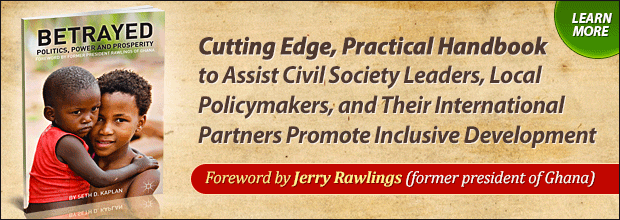 I am pleased to announce the publication of my new book on fragile states — Betrayed: Politics, Power and Prosperity (Palgrave Macmillan). The book focuses on the biggest challenges in the development field today: how to create inclusive societies, equitable governments, and dynamic economies that will give the poor the opportunity to accumulate the means and skills to control their own destinies. Up to now, change has proved illusive in most parts of the world, leaving three billion people — roughly one-half the population in the developing world — disadvantaged. The concrete suggestions described in my book are targeted at political, economic, and civil society leaders as well as scholars, practitioners, policymakers, and students.
I am pleased to announce the publication of my new book on fragile states — Betrayed: Politics, Power and Prosperity (Palgrave Macmillan). The book focuses on the biggest challenges in the development field today: how to create inclusive societies, equitable governments, and dynamic economies that will give the poor the opportunity to accumulate the means and skills to control their own destinies. Up to now, change has proved illusive in most parts of the world, leaving three billion people — roughly one-half the population in the developing world — disadvantaged. The concrete suggestions described in my book are targeted at political, economic, and civil society leaders as well as scholars, practitioners, policymakers, and students.
The book combines the latest research on poverty and state building with my personal observations drawn from many years working in the developing world, and covers a far wider range of issues than comparable titles. These include social exclusion processes, ideology, elite incentives, strategic urbanization, connectivity, livelihood factors, power dynamics, transaction costs, social networks, and business linkages.
Former President of Ghana Jerry Rawlings wrote the foreword, calling the book “a compelling and eloquent argument for empowering all citizens, especially the poor.”
I hope you will share this information with your colleagues and friends. You can order a copy from Amazon.
Academic faculty members who want to consider using the text for their classes can request an exam or desk copy here. The book is suitable for courses on international development, global poverty, foreign aid, the politics of development, African politics, Arab politics, comparative politics, and comparative economics.
An excerpt, endorsements, and the table of contents are provided below. Please contact me if you want any further information.
Sincerely,
Endorsements
“Kaplan makes a compelling and eloquent argument for empowering all citizens, especially the poor. He explains how hard-working individuals are shackled to their poverty, how discrimination stifles the entrepreneurial hopes of entire groups of people, and how political and economic exclusion conspire to keep elites rich at everyone else’s expense. . . . It is, he says, up to the elites and leaders of the developing world to start building and operating this machinery.” – Jerry Rawlings, Former President of the Republic of Ghana
“Betrayed is an interesting, readable presentation of a complex and often difficult subject. The author’s approach to and analysis of world poverty and what can be done to change the dynamic underpinning it will be a worthy read for both development professionals as well as the general educated reader.” – Andrew Natsios, Former Head, USAID
Table of Contents
List of Tables and Figures
Foreword
Acknowledgments
Part I: An Old Problem
1 The Same Species, the Same Dreams
2 The Blame Game
3 Who Are the Poor?
4 Why Are They Poor?
5 Breaking Out
Part II: A New Agenda
6 Self-Belief and Power
7 Building Support for an Inclusive Agenda
8 Constructing a More Effective State
9 Getting to a Workable Scale
10 Enhancing Opportunity
11 Enlarging Markets, Spreading Wealth
Part III: A Plan of Action
12 Leading Change from Within
13 What Role for Foreign Aid?
14 Putting It All Together
Notes
Index
How to Buy It
Betrayed is available on the following websites:



